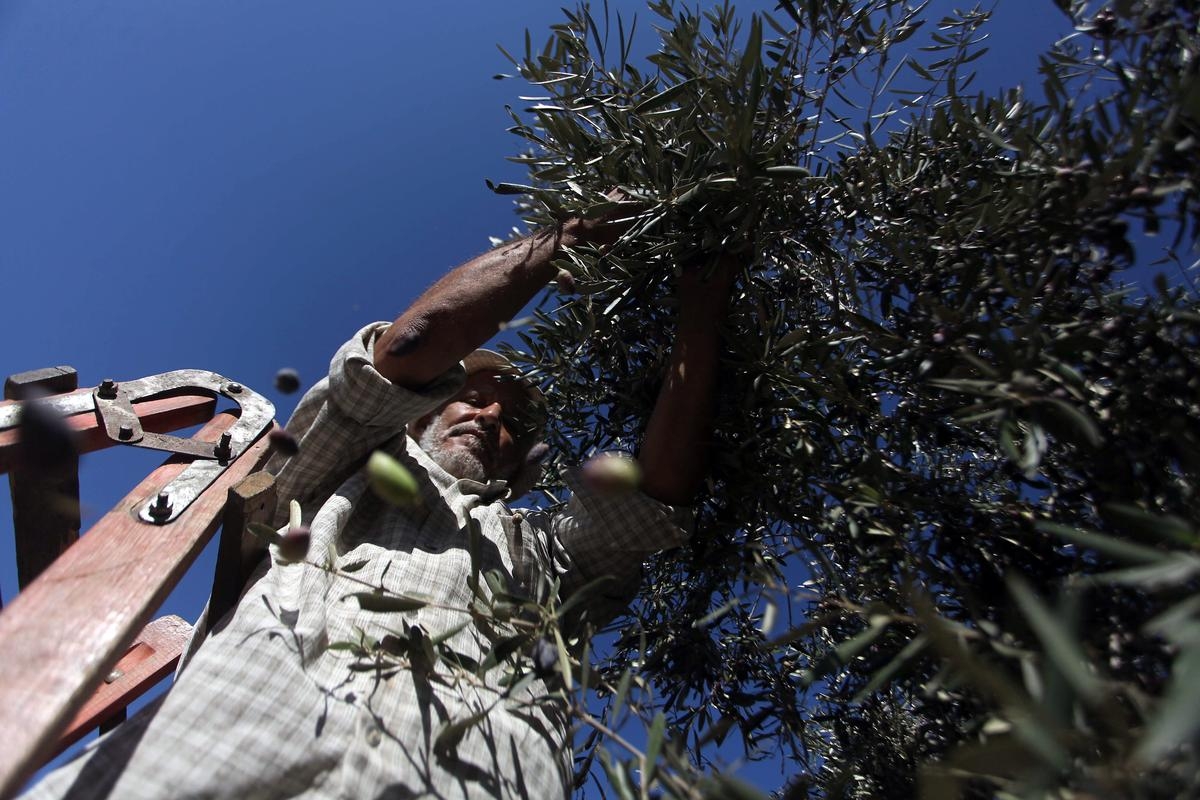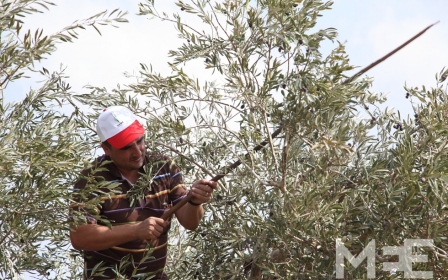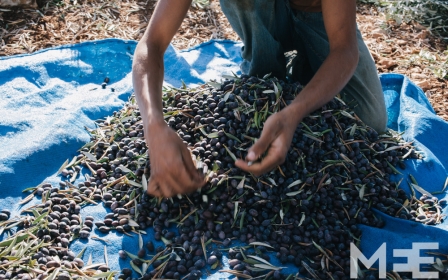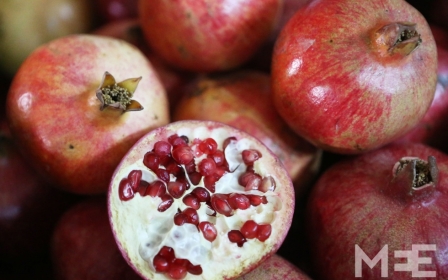The joys and sorrows of olive season in Palestine

It is the season for olives in Palestine. For a few weeks every year, the first rain clears the leaves and fruit of summer dust before the winter brings the cold and wet. Families gather on their land to bring in the year’s crop. It’s an occasion for getting together, and olives – zeitoun in Arabic – are about more than just oil and pickles. They’re symbols of land, belonging and Palestinian identity.
Today in the West Bank, however, the olive season is also a time of unease, when the difficulties of everyday life are thrown into sharp relief. Farmers harvest in fear of violence, bound by the constraints and restrictions of Israeli occupation that threaten to make zeitoun season more of a struggle than a joy.
In response to these difficulties, international volunteers often accompany farmers on their harvest; in Bil’in this week, a team from NGO, Rabbis for Human Rights travelled with five families to trees that, for 51 weeks of the year, lie out of reach beyond the separation wall. Although the land is both within the Green Line and privately owned by Bil’in residents, farmers can only access it through a gate that’s tightly controlled by Israeli authorities.
“It’s a depressing place, because they don’t have access to these trees except once a year for a week,” said Rabbi Yehiel Grenimann, the organisation's coordinator in the occupied Palestinian territories. “The trees are not pruned and the ground is not ploughed, they can’t do any weeding or things like that. Even this morning they had to wait a long time before getting through the gate, because the soldiers were late turning up.”
Every autumn, Rabbis for Human Rights recruits hundreds of volunteers to assist Palestinian farmers during olive harvests in high-risk areas. Every season they encounter some form of violence and intimidation, although this year, he says, has been relatively quiet. “We were surprised, with everything going on in the West Bank, Gaza, and East Jerusalem,” he said. “There have been incidents, but fewer than last year.”
Glance at RHR’s field report from 2013, and it’s obvious why some farmers might feel anxious about the annual harvest. In total, an estimated 2,000 olive trees were destroyed in the West Bank over the season. Most were burned or chopped down: in one village, a mobile home was placed in the middle of an olive grove. Near Yitzhar - a settlement that's become notorious for violence - two Palestinian farmers and two Israeli volunteers were injured by extremists who reportedly beat them using clubs and rocks; other villagers were prevented from reaching their land by soldiers
In Jalud, a village between Nablus and Ramallah encircled by settlements and outposts, farmers suffered what RHR called a particularly catastrophic attack when a group of “radical Israeli settlers” set fire to 400 olive trees. On a news website associated with the radical Israeli right, the arson was called a “price-tag” attack – revenge, it said, for the dismantling and eviction of a nearby outpost.
“This was a pogrom, plain and simple,” Arik Ascherman, RHR’s president said in a statement at the time, which urged the Israeli army to meet their responsibilities to protect Palestinians. “Despite all of the promises we received from the army to increase the security for Palestinian agriculture for the period before and during the olive harvest, the results show that there hasn’t been enough effort.”
Have Israeli authorities received the message this year? Representatives from the Israeli army did not respond to Middle East Eye’s request for comment, but on the ground, reports so far have been mixed. Student Yousef Natsheh, who's been documenting the harvest for the monitoring organisation, Christian Peacemaker Teams, seconded Greniman's observation: he's witnessed fewer troubles in his home town of Hebron than in previous years. “So far we’ve been working in Tel Rumeida, in central Hebron, and the olive harvests happen to have been quiet,” he said. “It helps that we have groups observing and protecting the farmers - it means they can film what happens, and explain international law and other issues in English if the settlers come.”
Quiet, however, does not mean completely free of problems. This weekend in Tel Rumeida, as soldiers and police watched, some 30 settlers were reported to have torn down the fence of an olive grove belonging to Mohammed Sadiq Knebi. Events like these are hardly unusual in a neighbourhood that’s long been notorious for being a zoned landscape of barbed wire and watch-posts, and fractured by Israeli settlements. Natsheh believes their continued expansion might be one of the reasons for having a quieter season.
“The difference this year is that the settlers have actually already taken a big part of Tel Rumeida for archaeological digging,” he explained. “They are working on making a park, and perhaps twenty or thirty olive trees have been destroyed in the process. So it might look like there are no problems, and that nothing is happening. But part of that is because such things have happened already.”
In Surif, a town some twenty minutes out of Hebron where Yousef and his team are also working, a calm harvest season is also overshadowed by the struggles and confiscations of preceding years. On Saturday, the team worked with other international and Palestinian activists on land that was threatened with confiscation first in 1976, then again just five years ago. Today, landowner Abu Marwan keeps watch of his olive grove at all hours every day, sometimes even walking through the darkened ridges by night to check for intruders.
"We are always afraid they will come back again and we expect them to come back again, so we’re watching this area all the time, even at night we sometimes check on the land because they could put the signs again," he said. "But we totally agree with the poem of Mahmoud Darwish: “There is on this land a worthy life.’”
Even Abu Marwan's patrols, however, could not prevent the establishment of the separation wall which cuts directly through Surif’s olive groves, just as in Bil’in. Of 2,500 trees, 500 are now inaccessible for most of the year. As his colleagues and neighbours shake the olives from the branches, Abu Marwan, who is a lawyer as well as a farmer, points to the curve of jagged fencing that cuts him off from his trees. “Anyone that has land behind the wall has a certain time that they can come, from 7:00 am until 7:30 am, and you have to stay there until 5:00 pm,” he explained. “That’s just for a week. You need to put as much as you can into the land to finish it in that time, but they don’t allow anybody through the gate except the landowners. And here’s the problem. If only me and my wife can access the land, we can't do much in such a limited time.
“Of course we have lost a lot of money now,” he continued. It's not just the fact that the time for harvesting is now limited: with so much of his land behind the wall, it's now impossible for Abu Marwan to reach the trees to take care of them. “We can’t just come to the land to plough it and take care of it like we need to. And because of that the trees die. That means production becomes very low.”
The help that farmers in towns like Surif and Bilin get during the harvest might not be enough to save it from these restrictions. But olive-harvesting has come to be just as much about solidarity as it is about economics. When a group of Palestinian activists from cities on the other side of the wall travelled to Surif on Saturday, they came to give practical help to the farmers there, but also, they said, to overcome the divisions imposed by Israel and reaffirm the collective heritage and identity of Palestinians.
“We’re here to help the people of Surif to protect their land from confiscation, and to protect the trees that symbolise life and Palestinian identity,” said Hazar Hijazi, an activist from Akka. “It’s important that we come together as Palestinians, against the Israeli oppression that affects us all.”
New MEE newsletter: Jerusalem Dispatch
Sign up to get the latest insights and analysis on Israel-Palestine, alongside Turkey Unpacked and other MEE newsletters
Middle East Eye delivers independent and unrivalled coverage and analysis of the Middle East, North Africa and beyond. To learn more about republishing this content and the associated fees, please fill out this form. More about MEE can be found here.




